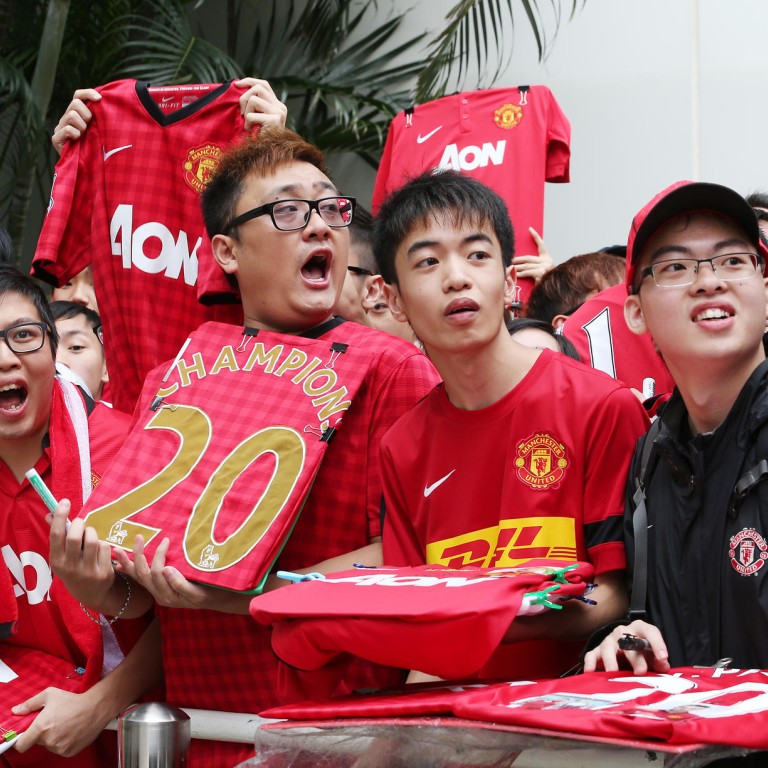
English Premier League clubs cash in on Asia die-hard fans
It's not just English Premier League clubs who are racing to cash in on a growing Chinese fan base
Money-spinning commercial sponsorship deals, a vast army of shirt-wearing fans and multimillion-dollar television rights contracts are fuelling the business of soccer in Asia - this weekend, Hong Kong has been firmly in the game's shop window.

English soccer's dominant position in Asia is set to be challenged by Spanish champions Barcelona, with the Catalan club announcing last week that it had bought 3,000 sq ft of office space at 8 Queen's Road Central to boost its presence in the region. The aim is to develop the club's commercial potential and increase sales to a growing Chinese fan base, sources in Spain said.
They are not alone: Manchester City, owned by Sheikh Mansour bin Zayed al-Nahyan of oil-rich Abu Dhabi, is in pursuit of their local rivals Manchester United. City chief executive Ferran Soriano said the club was looking for a more permanent presence in Asia - like Barcelona - to support its aspiration to be a global player.
However, City's first priority is to win trophies. "If football clubs focus on developing consumer brands and forget what they're all about they're not going to be successful," he said. "The challenge for us is to win. If we win on the pitch, we play good football, all the rest will come."
The 2011-12 season, in which City won the Premier League title for the first time, saw it become the second most televised English soccer club around the world. Its matches racked up 52,606 hours, only 2,221 fewer than Manchester United's.
More than 16 per cent of City's supporters come from China, and only 3 per cent from Britain. A deal to show one Premier League game a week on free-to-air TV on the mainland is a clear signal by the organisation to boost the audience of 330 million mainlanders who are interested in Premier League soccer.
More than 70 per cent of the world's 2.1 billion soccer fans - in 212 countries - watch Premier League soccer, making it the most watched league in the world.
Deloitte's sports business expert Austin Houlihan estimates English soccer's 36 separate broadcast deals in Asia generate £340 million (HK$4.05 billion) to £350 million per year for the game.
In contrast to the Premier League's collective broadcasting agreement, Spanish soccer clubs negotiate their TV rights individually. That means La Liga's global audience is far lower than the Premier League's, and Barcelona and Real Madrid take the lion's share of revenue, leaving little for the other clubs in the Spanish top division.
Not surprisingly, Real Madrid, Manchester United, Barcelona and Arsenal are the four most valuable soccer clubs in the world.
In the past week, Premier League clubs Manchester City, Tottenham Hotspur and Sunderland have taken part with South China in the Barclays Asia Trophy, uniting a fan base most of their European rivals can only dream of.
With 54 per cent of adults in Hong Kong interested in soccer and the Premier League, according to a fan survey by the league, it's no coincidence that Hong Kong has now hosted the Barclays Asia Trophy three times.
The sight of 20 double-decker buses plastered with a thank you from Premier League sponsors Barclays for supporting English soccer sends a clear message from the league that it is the only one worth following.
Some of Asia's biggest brands have struck multimillion-pound deals to put their names on Premier League players' shirts.
Hong Kong financial services company Goldenway is backing Welsh side Swansea City to the tune off HK$23.8 million, joining better known brands such as Samsung (Chelsea, HK$215 million per season), Standard Chartered (Liverpool, HK$238 million) and Thai brewer Chang (Everton, HK$36 million).
Sports journalist Jonathan Dyson says clubs are following the example set by Manchester United. "There's a huge race to replicate what Manchester United has been doing since the mid-90s."

